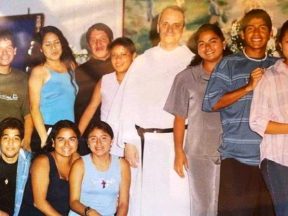The Challenges and Opportunities of Young People in the World Today.

At the end of pre-synod meeting, (Roma 19-24 March), more than 300 young people from different cultural and religious backgrounds, have released a document. It is divided into three sections: the challenges and opportunities of young people; faith, vocation, discernment and accompaniment and the Church’s formative and pastoral activities. A synthesis of the first part.
“Young people look for a sense of self by seeking communities that are supportive, uplifting, authentic and accessible: communities that empower them. We recognize places that are helpful for the development of their personality, namely family, which occupies a privileged position. In many parts of the world, the role of elders and reverence for one’s ancestors are contributing factors to the formation of their identities.”
“Crucial moments for the development of our identity include: deciding our course of study, choosing our profession, deciding our beliefs, discovering our sexuality and making life-changing commitments. Other things that can both shape and affect the formation of our identities and personalities is our experiences with the Church. Young people are deeply vested in and concerned about topics such as sexuality, addiction, failed marriages, broken families as well as larger-scale social issues such as organized crime, human trafficking, violence, corruption, exploitation, femicide, all forms of persecution and the degradation of our natural environment. These are of grave concern in vulnerable communities around the world. We are afraid because in many of our countries there is social, political and economic instability.”
“Young people are trying to make sense of a very complicated and diverse world. We have access to new possibilities to overcome differences and divisions in the world, but this is being realized in different realities and to varying degrees.
Many young people are used to seeing diversity as a richness and find opportunity in the pluralistic world.”
“Young people dream of safety, stability and fulfillment. Many hope for a better life for their families. In many places of the world, this means looking for physical safety; for others this relates more specifically to finding a good job or a specific lifestyle. A common dream across continents and oceans is the desire to find a place where the young person can feel that he or she belongs.”
“Young people dream of a better life, yet many are forced to emigrate in order to find a better economic and environmental situation. They hope for peace and are especially attracted to the “Western myth”, as depicted through media. Young Africans dream of a self-reliant local church, one that does not require aid that feeds into dependency, but one that is a life-giving contributor to its communities. Despite the many wars and intermittent outbreaks of violence, young people remain hopeful. In many Western countries, their dreams are centred on personal development and self-realization.”
“The impact of social media in the lives of young people cannot be understated. Social media is a significant part of young people’s identity and way of life. Digital environments have a great potential to unite people across geographical distances like never before. The exchange of information, ideals, values and common interests is now more possible. Access to online learning tools has opened up educational opportunities for young people in remote areas and has brought the world’s knowledge to one’s finger tips.”
“The duplicity of technology however, becomes evident when it leads to the development of certain vices. This danger is manifested through isolation, laziness, desolation and boredom. It is evident that young people around the world are obsessively consuming media products. Despite living in a hyper-connected world, communication among young people remains limited to those who are similar to them. There is a lack of spaces and opportunities to encounter difference.
Mass media culture still exercises a lot of influence over young people’s lives and ideals. With the advent of social media, this has led to new challenges over the extent to which new media companies have power over the lives of young people.”
Often, young people tend to separate their behavior into online and offline environments. It is necessary to offer formation to young people on how to live their digital lives. Online relationships can become inhuman. Digital spaces blind us to the vulnerability of another human being and prevent us from our own self-reflection. Problems like pornography distort a young person’s perception of human sexuality. Technology used this way creates a delusional parallel reality that ignores human dignity.
“We offer two concrete proposals regarding technology. First, by engaging in a dialogue with young people, the Church should deepen her understanding of technology so as to assist us in discerning its usage. Moreover, the Church should view technology – particularly the internet – as a fertile place for the New Evangelization. The outcomes of these reflections should be formalized through an official Church document. Second, the Church should address the widespread crisis of pornography, including online child abuse, as well as cyber-bullying and the toll these take on our humanity.”
“Many young people, when asked the question “What is the meaning of your life?” do not know how to answer. They do not always make the connection between life and transcendence. Lots of young people, having lost trust in institutions, have become disaffiliated with organized religion and would not see themselves as “religious.” However, young people are open to the spiritual.”
“Finally, others noted that while young people can ask questions about the meaning of life, this does not always mean that they are ready to commit themselves decisively to Jesus or to the Church. Today, religion is no longer seen as the main stream through which a young person searches for meaning, as they often turn to other modern currents and ideologies. Scandals attributed to the Church – both real and perceived – affect the confidence of young people in the Church and in the traditional institutions for which she stands.”
“The Church can play a vital role in ensuring that these young people are not marginalized but feel accepted. This can happen when we seek to promote the dignity of women, both in the Church and in wider society. Today, there is a general problem in society in that women are still not given an equal place. This is also true in the Church. There are great examples of women serving in consecrated religious communities and in lay leadership roles. However, for some young women, these examples are not always visible. One key question arises from these reflections; what are the places where women can flourish within the Church and society? The Church can approach these problems with real discussion and open-mindedness to different ideas and experiences.”
“There is often great disagreement among young people, both within the Church and in the wider world, about some of her teachings which are especially controversial today. Examples of these include: contraception, abortion, homosexuality, cohabitation, marriage, and how the priesthood is perceived in different realities in the Church. What is important to note is that irrespective of their level of understanding of Church teaching, there is still disagreement and ongoing discussion among young people on these polemical issues. As a result, they may want the Church to change her teaching or at least to have access to a better explanation and to more formation on these questions. Even though there is internal debate, young Catholics whose convictions are in conflict with official teaching still desire to be part of the Church. Many young Catholics accept these teachings and find in them a source of joy. They desire the Church to not only hold fast to them amid unpopularity but to also proclaim them with greater depth of teaching.”
“Ultimately, many of us strongly want to know Jesus, yet often struggle to realize that He alone is the source of true self-discovery, for it is in a relationship with Him that the human person ultimately comes to discover him or herself. Thus, we have found that young people want authentic witnesses – men and women who vibrantly express their faith and relationship with Jesus while encouraging others to approach, meet, and fall in love with Jesus themselves.”



